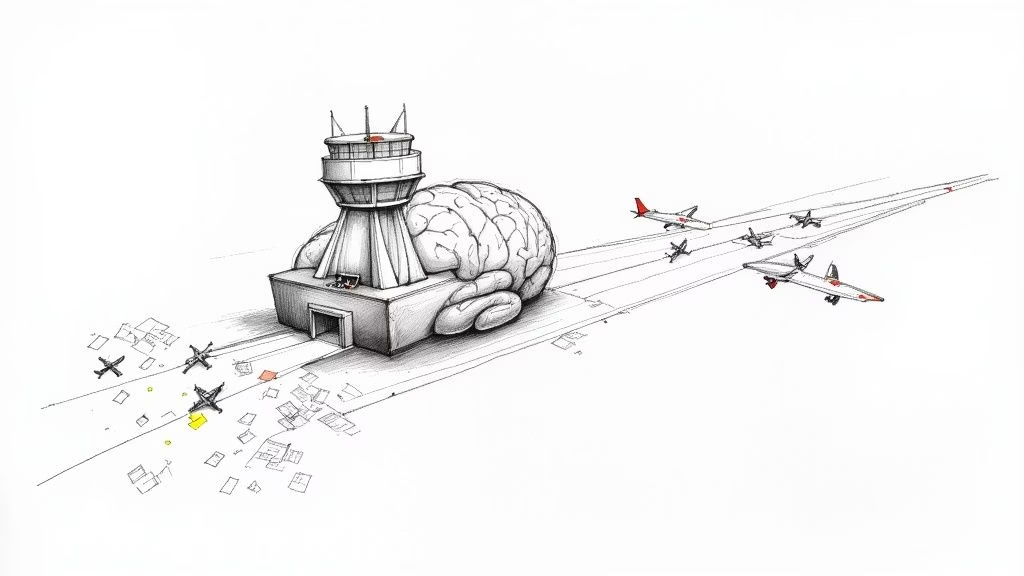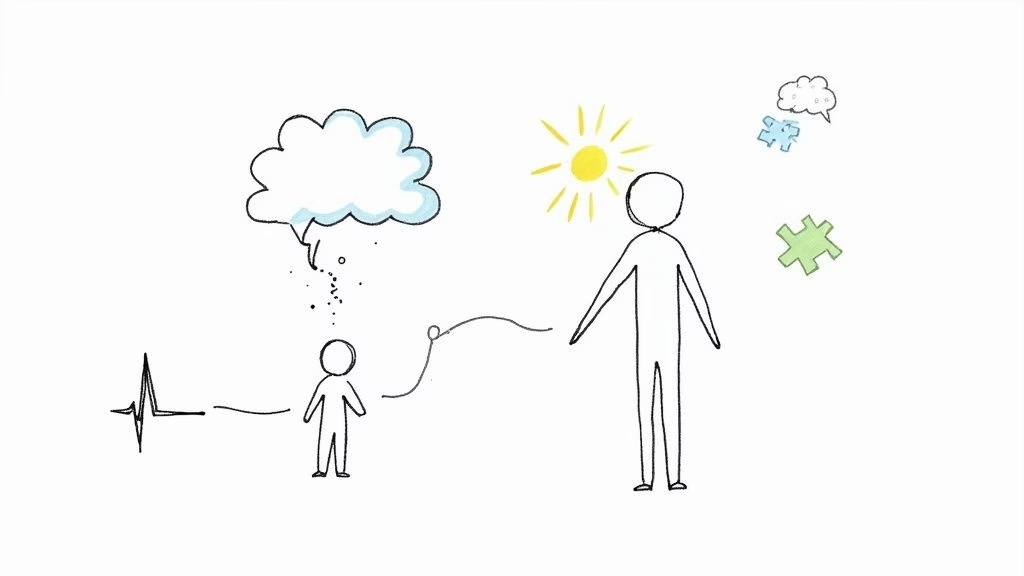Learning how to connect with others is like mastering a new language. For teenagers, it’s a language that requires patience, a lot of practice, and real-world experience to become fluent. And in an age where screens seem to dominate everything, these skills are more vital than ever for navigating friendships, school, and just figuring out who you are.
Why Modern Teens Need Strong Social Skills

The social world teens live in today is a completely different landscape than the one their parents grew up in. The biggest change? A massive shift from face-to-face hangouts to texting and DMs.
Research from EnvisionExperience.com highlights a startling trend: between 2003 and 2022, in-person socializing among teens dropped by over 45%. That’s a huge decline, and it means fewer organic chances to practice reading body language, making eye contact, or understanding personal space—the subtle stuff that just doesn’t come across on a screen.
This communication gap isn’t just awkward; it can have a real impact on a teen’s well-being and even their schoolwork. When teens have a hard time connecting with their peers, it can open the door to feeling isolated and anxious. Those feelings can drain their motivation for school and fuel procrastination. Strong social skills aren’t about being the most popular kid in school; they’re about building resilience and a solid sense of self.
The Link Between Social Skills and Teen Success
Think of social competence as a powerful toolkit that helps teens build a strong support network. This network becomes their anchor when they’re dealing with the inevitable stress from exams, drama with friends, or just feeling insecure. Without these tools, asking for help, working on a group project, or simply standing up for themselves becomes a lot harder.
A teen who can confidently start a conversation, truly listen when a friend is venting, and work through a disagreement is just better prepared for whatever life throws at them. These abilities create a sense of belonging and are directly tied to their overall happiness and confidence. Improving these skills often leads to better mental health and a more positive self-image. For parents wanting to help, a great place to start is by boosting self-esteem in teenagers.
Social skills are the bridge between a teen’s internal world and their external reality. Building this bridge helps them turn potential isolation into meaningful connection, boosting their motivation and mental health.
To get a clearer picture, let’s look at some core social skills and why they’re so important for a teen’s development.
Core Social Skills and Their Impact
This table breaks down the essentials and how they translate into everyday success.
| Social Skill | Why It Matters for Teens |
|---|---|
| Active Listening | Shows respect and empathy, making others feel valued and understood. |
| Verbal Communication | Enables clear expression of thoughts and needs, reducing misunderstandings. |
| Non-Verbal Cues | Helps interpret social situations accurately by reading body language and tone. |
| Empathy | Fosters deeper connections by allowing them to understand others’ feelings. |
| Conflict Resolution | Provides tools to navigate disagreements constructively without damaging relationships. |
Mastering these skills isn’t about changing who a teen is. It’s about giving them the confidence and the tools to show up as their best self in any situation.
Navigating the New Teen Social World
It’s easy for parents to look at a busy school schedule and a phone that never stops buzzing and think, “My teen has a great social life.” From the outside, it looks like they’re connected and supported. But for many teens, navigating their social world feels more like being dropped into a high-stakes video game with no tutorial. The rules are unwritten, everyone seems to know how to play except them, and they often feel like they’re going it completely alone.
This isn’t just a hunch. The gap between what parents see and what teens feel is very real. A recent, eye-opening report found that while 93.1% of parents believe their child gets enough social and emotional support, only 58.5% of teens actually feel that way. That’s a massive disconnect, and it matters because a lack of real support is directly tied to an increase in anxiety, depression, and other mental health struggles. You can dig into the full findings on the American Psychological Association’s website.
The Paradox of Digital Connection
So how can today’s teens be more “connected” than any generation before them, yet report feeling so profoundly lonely? The answer is all about the quality of their connections, not the quantity.
Endless texting and scrolling through social media can create the illusion of a community. But it often fails to deliver the genuine emotional backup that only comes from real, face-to-face interaction.
Think of it this way: a teen might have hundreds of online “friends” but not a single person to sit with at lunch. They can get dozens of likes on a photo but have no one to call when they’re having a bad day. This is the paradox of their world—being digitally surrounded by people while feeling emotionally isolated. It’s a huge source of stress that can make them feel inadequate and fuel a cycle of anxiety, making it even harder to build the social skills for teens they need to form real, authentic friendships.
The Impact on Motivation and Mental Health
When a teen feels socially cut off, the fallout almost always spills into other parts of their life, especially school. A lack of belonging can absolutely crush a kid’s motivation. Why would you pour your energy into a group project if you feel like an outcast? Why would you speak up in class if you’re terrified of being judged? Suddenly, procrastination and slipping grades aren’t just about laziness; they’re symptoms of a much deeper social and emotional battle.
The sheer weight of trying to figure out social challenges all alone is exhausting. It leaves very little mental energy for homework, hobbies, or just growing up. Getting to the root cause—the need for stronger social and emotional support—is the most important thing we can do to help teens get back on their feet.
For parents, understanding this is the first real step. This isn’t about blaming your teen, their phone, or their friends. It’s about recognizing the unique and intense pressures they’re under and working to close that perception gap with empathy, patience, and a whole lot of open conversation.
Breaking Down the Most Important Social Skills
Helping a teen build strong social skills isn’t about giving them a giant rulebook to memorize. It’s far more practical. Think of it like helping them assemble a toolkit they can grab from in any social situation, from the classroom to their first job interview. To make it less overwhelming, we can break it down into three core pillars: how you talk, how you act, and how you understand others.
This infographic really simplifies these ideas, zeroing in on the foundations of active listening, nonverbal communication, and empathy.
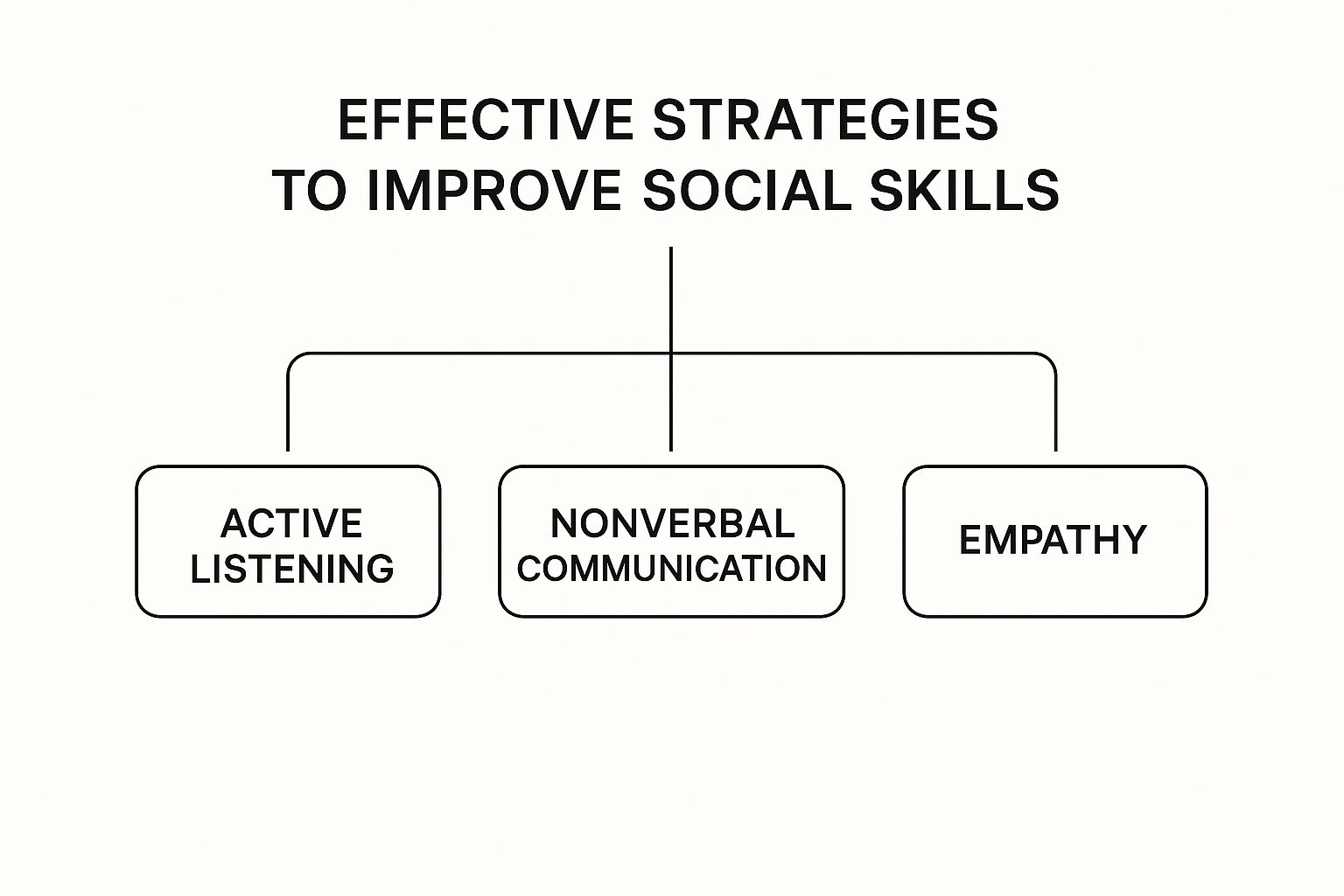
When you look at it this way, you can see how mastering these three areas gives them a solid base for everything else. All other social interactions really just build on these fundamentals.
Verbal Communication Skills
The first pillar is all about what your teen says and, just as importantly, how they say it. This goes way beyond just being able to talk. It’s about learning to engage in a way that makes other people feel genuinely heard and seen.
- Active Listening: This is a big one, and it’s more than just staying quiet until it’s your turn to speak. It’s about fully absorbing what someone else is saying—a skill many teens (and adults!) struggle with. A great way to model this is to put your phone down and give your teen your complete attention when they talk. You’re showing them what it feels like to be truly heard.
- Asking Great Questions: Nudge your teen to ask open-ended questions, the kind that can’t be shut down with a simple “yes” or “no.” Instead of, “Did you have a good day?” try asking, “What was the most interesting part of your day?” That one small shift can open the door to a real conversation.
Non-Verbal Communication Cues
So much of what we communicate has nothing to do with words. For teens, learning to read and use non-verbal cues is like cracking a code; it helps them understand the real story behind what people are saying.
Body language, posture, and eye contact are all sending messages, whether we realize it or not. A teen who’s slouched over and avoiding eye contact might come across as bored or unconfident, even if they’re just feeling nervous. You can practice this at home in a really low-pressure way. During a family dinner, just gently remind them to sit up and look at who they’re talking to. It reinforces that these actions are signs of respect and engagement.
Teens often have a hard time connecting how they feel on the inside with how they appear on the outside. Helping them see that their body language sends a powerful message is a huge step in building their social awareness and, eventually, their confidence.
Emotional Intelligence and Empathy
This is the most complex pillar, but you could argue it’s the most important. Emotional intelligence is the ability to recognize and manage your own feelings while also tuning into the emotions of others. It’s the very foundation of empathy.
A lot of teens who seem to be struggling with things like school motivation or procrastination are actually dealing with emotional challenges just below the surface. Feeling misunderstood or disconnected from their peers can completely drain the energy they have for schoolwork. Research consistently shows that teens with a strong sense of empathy are better at navigating disagreements and building the kind of supportive friendships that are so vital for their mental health and resilience.
You can foster this by encouraging them to see things from another person’s perspective. If they’re in a conflict with a friend, try asking: “How do you think they might be feeling right now?” That single question can be the key that unlocks empathetic thinking. For more support, organizations like NAMI offer fantastic resources on teen mental health, helping bridge the gap between social struggles and emotional well-being.
Practical Ways You Can Nurture Social Confidence
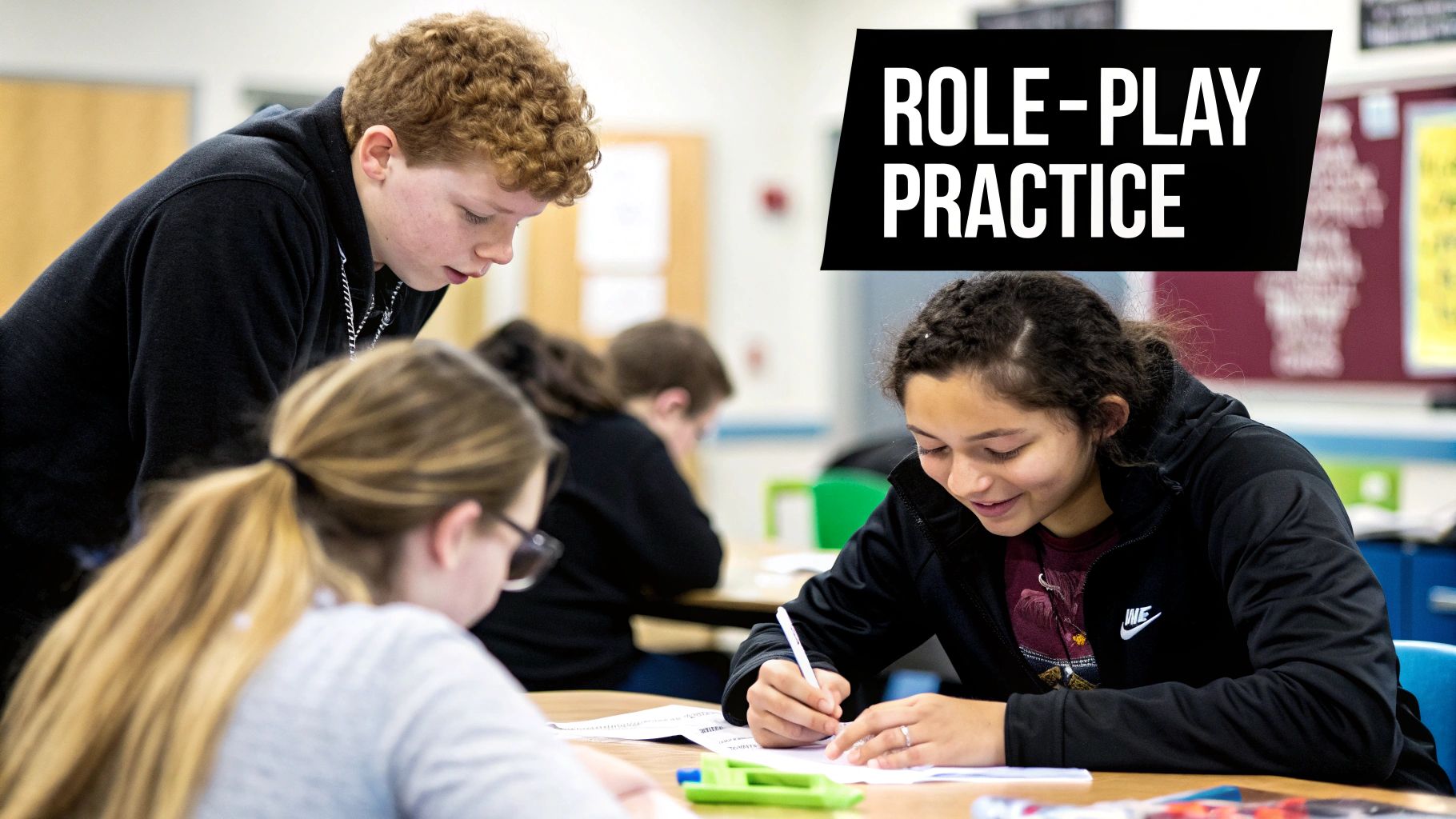
As a parent, your role isn’t to be a demanding director but a supportive coach. Your goal is to create a home where your teen can practice social skills, mess up, and get feedback without any fear of judgment. This safe space is the foundation they need to build real confidence for the complex world waiting outside.
One of the most powerful things you can do is simply model good social behavior. Let your teen see you in action. When you greet a neighbor with a genuine smile, listen with your full attention on a phone call, or handle a frustrating customer service issue with calm respect, you’re giving them a live masterclass in social grace.
Create Low-Pressure Practice Opportunities
Pushing a teen to be “more social” usually backfires. It just ramps up their anxiety and makes them want to retreat even more. The better approach is to find low-stakes situations where they can practice their social skills for teens in a setting that feels natural and comfortable. This shifts the goal from performance to genuine connection.
- Family Game Nights: Board games and card games are a fantastic, low-key way to practice taking turns, engaging in friendly banter, and just having a lighthearted conversation.
- Encourage a Club or Hobby: Supporting an interest—whether it’s coding club, a sports team, or a volunteer group—is a game-changer. It puts them in a structured environment with kids who already share their passion, making it way easier to start a conversation.
- Simple Errands: Ask them to order the pizza on the phone or pay the cashier at the store. These small, successful interactions are like tiny confidence boosters that add up over time.
Your home should be a social laboratory where experiments—even the ones that fail—are just seen as learning experiences. When a teen knows they won’t be judged for an awkward moment, they’re far more willing to get back out there and try again.
Address Motivation and Mental Health
Sometimes, a teen’s hesitation to socialize isn’t about shyness at all. It can be tied to deeper issues like burnout, school stress, or their mental health. We know from research that teens dealing with anxiety or depression find social events incredibly draining, which often leads to procrastination and a desire to isolate.
Having open, non-judgmental conversations is everything. Instead of asking, “Why don’t you ever hang out with your friends?” try a gentler, more observant approach: “I’ve noticed you seem a bit down lately. Is everything okay at school?” This opens the door for them to share what’s really going on without feeling like they’re being accused of something.
It’s also crucial to help them navigate social bumps in the road, like rejection or misunderstandings. These things are going to happen, and their ability to bounce back is what matters. Focusing on building resilience in teens gives them the emotional toolkit to recover from a social stumble and not be afraid to try again. For more direct support, organizations like NAMI (National Alliance on Mental Illness) have fantastic resources for families navigating the challenges of teen mental health.
How Social Skills Impact Motivation and School Success
The connection between social skills and doing well in school is far more direct than most people think. It’s not just about grades—it’s about a teen’s entire drive to show up and engage with their life at school. When a teen feels lonely or can’t seem to find their footing with friends, their motivation can completely bottom out. Suddenly, homework, speaking up in class, or even just getting out the door feels like climbing a mountain.
Think of social connection as the fuel in a teen’s tank at school. Positive friendships and feeling like you belong keep that tank full. Without them, a teen is running on empty. This often shows up as procrastination, a “don’t care” attitude, or a sudden dive in grades. These aren’t just signs of laziness; they’re often symptoms of profound social and emotional burnout.
The Long-Term Connection to Achievement
The ripple effects of strong social skills for teens go way beyond the high school hallways. They are a massive predictor of what comes next. The ability to work with others on a group project, get the courage to ask a teacher for help, or work through a dumb argument with a friend—these are the building blocks for college and a career.
A fascinating 20-year study really drives this home. It found that kids with higher social competence scores were twice as likely to earn a college degree in early adulthood than their peers who struggled socially. This isn’t a small difference. It shows just how critical skills like communication and problem-solving are for the long haul. You can dig deeper into these findings about how social skills affect teens.
Social isolation at school acts like a drain on a teen’s motivation. When they feel disconnected from their peers, their drive to participate and succeed academically often diminishes, leading to procrastination and disengagement.
Parenting Tips to Bridge the Gap
As a parent, you’re in a unique position to help your teen connect the dots between their social world and their school life. The trick is to focus on the root cause—their sense of connection—instead of just the symptoms, like slipping grades.
Here are a few ways you can help:
- Validate Their Feelings: If your teen is venting about drama at school, just listen. Don’t jump in to fix it. Acknowledge that friendships are hard to navigate and that it’s completely normal for it to impact their mood and energy.
- Focus on Small Wins: Encourage tiny, doable social steps. It could be as simple as joining one club (even if they only go once) or having one friend over to study. These small positive interactions can start to build momentum.
- Discuss Procrastination Openly: Instead of coming down on them for putting things off, get curious. Try something like, “I’ve noticed you’re having a tough time getting started on that history paper. Is there anything going on in that class that’s making it a drag right now?”
By framing school performance as something tied to their social well-being, you help them build the confidence they need to thrive. If motivation is still a huge struggle, it might be time to look at more focused strategies. For more targeted advice, you can learn how to motivate a teenager who feels stuck.
Key Resources for Teen Social and Mental Health
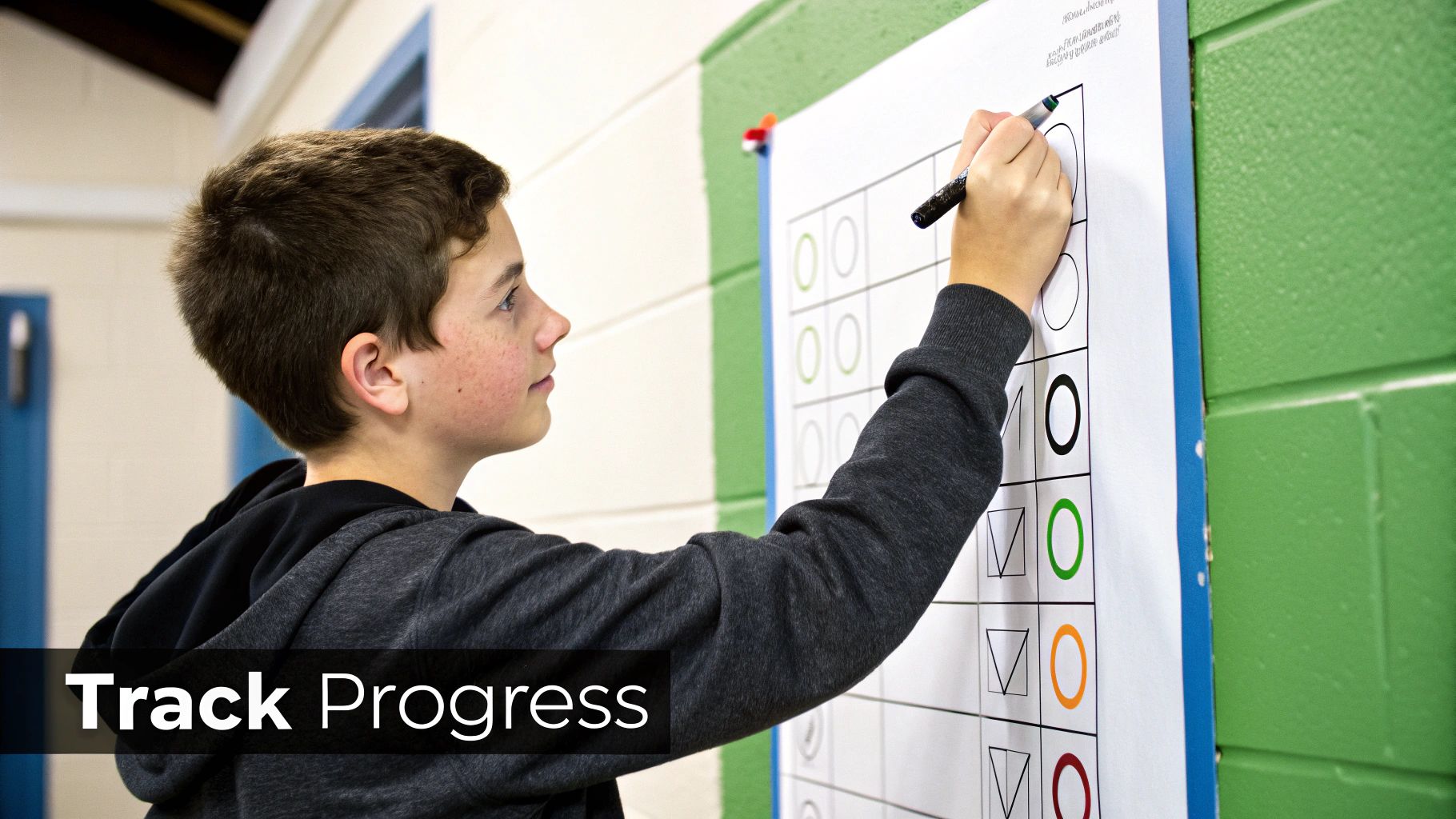
Watching your teen navigate their social and emotional world can feel like a heavy lift, but you absolutely don’t have to carry it alone. It’s so important to have a strong support system, especially when social struggles are tied to deeper issues like a lack of motivation, procrastination, or anxiety. I’ve put together this toolkit of credible, genuinely helpful resources for both you and your teen.
Where to Find Support
Finding the right kind of help is one of the most powerful things you can do to foster strong social skills for teens. A great first step is to check out organizations that are dedicated to adolescent well-being.
- Mental Health Organizations: Groups like the National Alliance on Mental Illness (NAMI) are incredible. They offer extensive resources, support groups, and educational materials made specifically for families figuring out teen mental health. They really help connect the dots between social challenges and emotional wellness.
- Skill-Building Tools: You can also look into apps designed for practicing emotional regulation and conversation skills. These tools can be a fantastic, low-pressure way for teens to build confidence on their own before trying out their new skills in the real world.
When you see a teen’s motivation drop at school or procrastination starts to take over, it’s often a flag for underlying emotional or social stress. Looking into mental health research and professional resources isn’t a last resort—it’s a proactive step toward their overall success and happiness.
Common Questions Parents Ask About Teen Social Skills
Watching your teen navigate their social world can bring up a lot of questions. I get it. It’s a complex time, and it’s natural to have concerns. Here are some of the most common questions I hear from parents, with practical answers that touch on motivation, school, and mental health.
My Teen Is an Introvert. Does That Mean They Have Poor Social Skills?
Not at all. This is a huge misconception, and it’s so important to get this one right. Being an introvert isn’t a social flaw; it’s simply about where your teen gets their energy. Extroverts feel recharged by being around people, while introverts need alone time to refuel.
The goal isn’t to turn your introverted teen into a social butterfly. It’s about helping them find confidence in social settings in a way that feels authentic to them. You can help them build on their natural strengths—like becoming an amazing listener or nurturing a few deep, meaningful friendships instead of chasing a huge group of acquaintances.
How Can I Help My Teen with Procrastination and School Motivation?
If you’ve noticed a sudden drop in your teen’s motivation or a big jump in procrastination, it’s often a sign that something else is going on under the surface. Social stress is a massive energy drain. When a teen feels anxious or alone at school, they have very little mental fuel left for homework and studying.
Instead of leading with their grades, try opening a gentle conversation about how things are feeling at school. Acknowledge that social well-being and academic drive are deeply connected. For more resources on this, organizations like the National Alliance on Mental Illness (NAMI) offer fantastic research and guidance for families on the link between a teen’s mental health and their school performance.
It’s worth remembering that procrastination can be a coping mechanism for social anxiety. If you can help address the root emotional challenge, you’ll often see their motivation for school return naturally.
When Should I Think About Getting Professional Help for My Teen?
Trust your gut on this one. As a parent, you have the best instincts. If you see that your teen’s social struggles are causing them real distress or getting in the way of their daily life—school, family, hobbies—it’s a good time to explore professional support.
A few key signs to watch for include:
- Constant anxiety about going to school or social events.
- Total withdrawal from friends and activities they used to love.
- A sharp and lasting drop in their grades.
- Clear symptoms of depression or overwhelming sadness.
A therapist who specializes in working with teens can provide a safe space and targeted strategies to help them build back their confidence.
If you’re looking for dedicated support to help your teen build confidence, manage stress, and find motivation, Andrew Petrillo Life Coaching offers personalized, one-on-one programs. Discover how practical strategies can empower your teen to navigate high school, college, and beyond. Learn more at https://andrewpetrillolifecoaching.com.

















